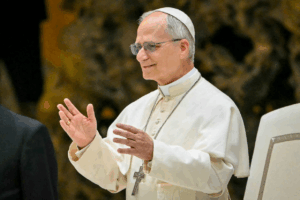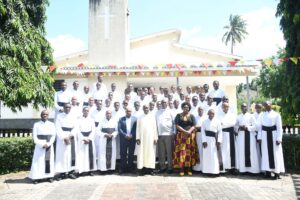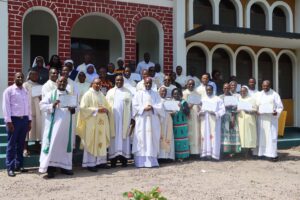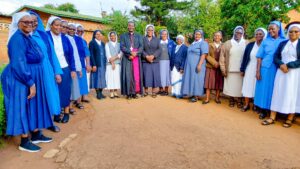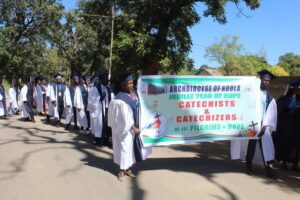TANZANIA: Religious Leaders Mourn the Death of Outstanding Economists Professor Ngowi
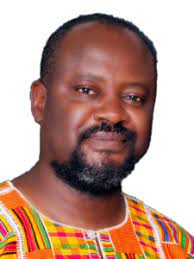
Prof Ngowi
Sarah Pelaji
Religious leaders in Tanzania have expressed grief over the death of a legendary economist, Professor Honest Ngowi who died on road accident on March 28, 2022.
Prof Ngowi and his driver died at Mlandizi, Coast Region, when a container fell off a lorry, and landed on his car.
Prof Honest Ngowi was Associate Professor of Economics, researcher and consultant in Economics and Business at Mzumbe University.
He has been working with the Catholic Church and the Interfaith Standing Committee on Economic Justice and Integrity of Creation in Tanzania (ISCEJIC).
All religious leaders in Tanzania mourn his death which has left a huge gap due to the professional cooperation that existed between him and them, including carrying out various studies and scientific research which contributed to bringing about policy amendments in the country.
Among the policies that the government has amended based on his collaboration religious leaders in the country are the Mining Policy (2010), the International Tax Policy, Health and Social Security Policy. Speaking with AMECEA Correspondence, the religious leaders Identified Professor Ngowi as a man endowed with wisdom and prudence in performing his duties.
The Archbishop of the Tabora Archdiocese and the First Chairman of ISCEJIC, Most Rev. Paul Ruzoka has described Prof. Ngowi as one of the patriotic Tanzanians who dared to use his profession fearlessly to liberate the lowly Tanzanians.
Archbishop Ruzoka who worked with Prof. Ngowi as he chaired the presidency from 2008-2016, said that the Professor has been a beacon in the dark, especially when he has contributed to how the government loses revenue from mining royalties. “We religious leaders including Tanzania Episcopal Conference TEC, the he National Muslim Council of Tanzania (BAKWATA) and the Christian Community of Tanzania (CCT), conducted various scientific study in 2008 named ‘A Golden Opportunity’ to address important questions raised by the mining industry – what it is contributing to our communities and our economy and what it is not contributing. We came out with findings on how Tanzania is failing to benefit from gold mining.
There religious leaders were able to determine that mining companies in the country were paying less royalties (revenue from profits) compared to the actual profits they were making. “The results of our research helped Government to re-amend the mining policy. We couldn’t make it without our expert Prof. Ngowi. I admit that we religious leaders have lost a man who was patriotic, educated and knowledgeable. I offer my deepest condolences to his family, the entire Mzumbe University Community for the departure of their key lecturer,” he said.
In his speech, the Secretary General of Tanzania Episcopal Conference (TEC), Rev. Charles Fr. Kitima said that the Religious leaders in the country have lost a scholar who devoted his time and talents to the development of the people and his country adding that in the case of the Catholic Church, Prof Ngowi was a Catholic and an ex-seminary who studied at St James Seminary in Kilimanjaro. His brother is a Catholic priest and Head of the Church Organization.
Inspired by his faith, his development and his gift of teaching, Prof Ngowi has been instrumental in providing training, orientation seminars and even texts for Church Project Proposals. From time to time he has been giving seminars to Catholic Church Leaders on all fronts.
Recently, on January 29, 2022 Prof Ngowi led a seminar organized by the Archdiocese of Dar es Salaam on entrepreneurship where he spoke on the importance of having a clean, God-fearing spirit and the importance of economic growth. Retired Bishop of the Evangelical Lutheran Church in Tanzania (ELCT) Diocese of North East and Retired Vice-Chairman of ISCEJIC, Bishop Stephen Munga, said the technical work done by Prof. Ngowi on behalf of the clergy, was serious and at sometimes, endangering his life, but he said he did it wholeheartedly knowing its benefits to Tanzanians.
“For example, the study of The One Billion Question ‘which we later gave him the task of translating into Kiswahili, this was a professionally loaded study. We worked well with him and at that time I was the Vice Chairman of ISCEJIC,” he said.
“And even when we were called to Tanzania Revenue Authority (TRA) to defend our research, he responded technically… he wanted what he knew to benefit all Tanzanians.”
The Sheikh of Mwanza Region and the Co-Chair of the Interfaith Committee in the region, Sheikh Hassan Kabeke, said that Prof. Ngowi has been brave enough to co-operate in researching for religious leaders, although sometimes he risked his life.”
Prof Ngowi also collaborated with Religious Leaders in preparing various policy publications under the Interfaith Union. These included:
- Our People or Our Gold, Golden Opportunity: How Tanzania is failing to benefit from Gold mining;
- The One Billion Dollar Question: How can Tanzania Stop Loosing So Much Tax Revenues 2012;
- The One Billion Dollar Question: Revisited Five Years Later;
- How Much is Tanzania Now Loosing in Potential Tax Revenue?
- Uranium Scoping Study: the state of uranium exploration and its economic potential;
- the Environmental Study in North Mara and Geita;
- Make it Possible: How Tax Commitments Can Move Tanzania Towards Universal Health Insurance Coverage;
- Social Market Economy Model for Tanzania: Towards Inclusive and Sustainable Economic Model;
- Policy Impact Assessment of the One Billion Questions Reports.
These contributed to major discussions in the country under Religious Leaders and facilitated the reform of various policies such as the Mining Policy 2009, the Mining Act 2010, International Tax Policies, Social Security Policy, Universal Health Insurance Policy and Law.
Born on September 15, 1967, Prof Ngowi was a highly respected scholar, a creative thinker, and a productive writer in Tanzania. He was enthusiastic about the TaxCapDev-network from its creation and lent his support and encouragement by extending the network’s outreach in East Africa.
He has worked in various countries in Africa and beyond, including Burundi, Ethiopia, Kenya, Malawi, Rwanda, Senegal, South Africa, Swaziland, Uganda, Zambia, India and Norway.
